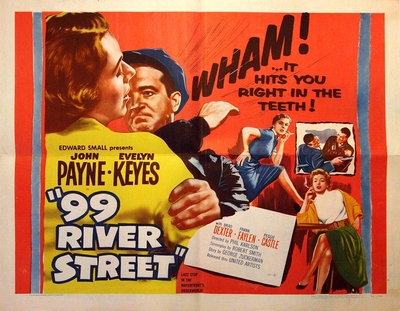There's a maxim that connoisseurship rewards obscurity. In other words, if your interest in something becomes deep and abiding, you start seeking out increasingly rarer and unseen examples of that thing, whatever it is. It's the urge that forces oenophiles to pay thousands for bottles of wine produced in a Burgundy vineyard no bigger than a Costco parking lot, or inspires record collectors to spend years looking for a test pressing of a 1996 techno record.
The same thing happens with fans of movie genres like film noir. An enthusiastic noob will post somewhere that they were blown away by The Maltese Falcon on TCM and did an impulse purchase of the Warner Bros. Film Noir Collection Vol. 1 DVD box set on Amazon – the one with Gun Crazy and Out of the Past. "Look, I'm sure you thought those were great," some jaded aficionado will respond, "but have you watched Crime Wave or Kansas City Confidential or Murder by Contract? You really don't know noir until you've seen Yves Allégret's Dédée d'Anvers."
An old friend of mine, a documentary director and film and music buff, calls this "neophilia" – a constant search for the thing you've never heard or seen before, having exhausted the ability to get the same buzz you once got from some more famous, tacitly mainstream example of hard bop or psychedelic folk or Thai funk. (Though if you even know about Thai funk, you probably have long since ascended into a rarified level of connoisseurship, and are running out of shelf space.)
It's far more expensive to produce a movie than a record, so there are limits to the obscurity of films. So unless your life's mission is to hunt down the only 16mm work print of a rare noir filmed in Phoenix in 1959, whose only "star" was Elisha Cook Jr., making a brief cameo while passing through town on a family vacation to the Grand Canyon, your holy grails are the sorts of films that get screened on TCM once a year, late at night, during the balmy stretches of summer vacation.
Films like 99 River Street, from 1953. By the time the film was released, most of the genre's masterpieces – pictures like Double Indemnity, Mildred Pierce, Detour and Force of Evil – had been released, and even if they didn't know the term "film noir," they knew what they were looking at when they saw a film with tough guys, dangerous dames and low-rent locations.
Like a boxing ring, which is where director Phil Karlson starts the film – a championship bout between the reigning title holder and contender Ernie Driscoll (John Payne), who we also see watching the match years later on television. The fight is going well for Ernie at first, but the champ manages to open up a cut above Ernie's eye; the scene is remarkably brutal, with more blood than audiences usually saw. The judges halt the fight and call it for the champ, doubling down on Ernie's loss by banning him from fighting for fear of losing his sight with one more injury.
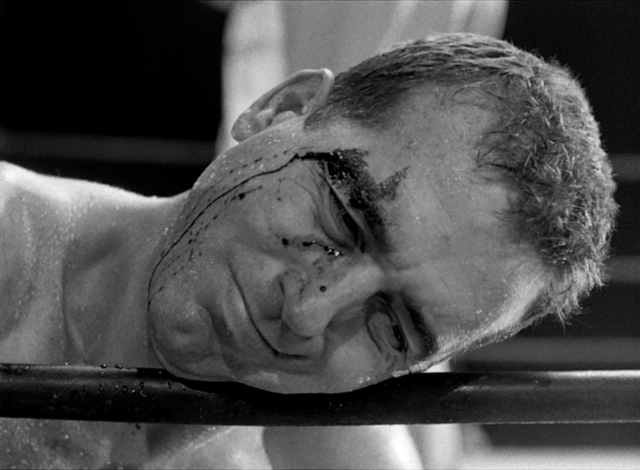
Which is where we find Ernie, four years later, driving cab and married to Pauline (Peggie Castle), a good-looking woman who thought she was marrying a prizefighting champ and ended up wed to a cabbie and working at a florist, her own showbiz dreams left behind. The wrong people, married for the wrong reasons, in a marriage that's more like a trap.
"I could have been a star if I hadn't married you," she spits at him while he drives her to the shop.
"You were a showgirl," he sullenly barks back. "I could've been the champion."
It's a textbook noir setting – the sunless side of the postwar economic boom, populated by the people who fall through the cracks, unable to get a toehold on those rising wages, on the white collar management boom, and get their ticket to the suburbs. But after all somebody still has to drive the cabs and pour the coffee and arrange the congratulatory bouquets; today we call it the "service industry" and pretend that it's all part of the same urban so-called "creative economy" that includes code writers, chefs and gallery owners.
Pauline isn't the only woman in Ernie's life; at the coffee shop near his cab stand he runs into Linda (Evelyn Keyes), an aspiring actress taking her chance in the big city, which this night has turned into a shot at a big part in a play. She obviously has a soft spot for Ernie, but she's the movie's nice girl and no homewrecker, though the way she talks about the audition she has that night – alone in the theatre with the director – should set off alarm bells.

Ernie's night gets worse when he swings by the flower shop only to see his wife through the window in the arms of Victor (Brad Dexter), a dead-eyed jewel thief and hood who she's been two-timing Ernie with – he's been buying her gifts and used her as an accomplice on his latest job, robbing $50,000 worth of stones from a gem dealer.
Hurt quickly turns to rage for Ernie, and unfortunately he takes it out on one of his few friends – Stan (Frank Faylen), his boss and dispatcher at the taxi company. Ernie goes back to his old gym to beg for a fight, but his old manager won't give it to him. By the time he gets back to the cab stand he's a ticking time bomb, which is when Linda pulls him aside, panicked and desperate, and tells him she's killed a man.
He follows her to the deserted theatre where a body lies on the stage; she tells him the story about how the director had tried to assault her, and how she'd bludgeoned him to death in a panic. He tells her that he can handle it – he knows a place outside the city where he can bury the body. Suddenly the lights come on and the dead man sits up: it's all been a set-up, a test of Linda's talent, and that his response was so good that they want to use some of his lines in the play, and will twenty bucks cover his trouble. It won't, and after Ernie punches his way off the stage they decide to call the police and use Ernie's arrest to stir up some publicity for Linda's incredible acting skills.
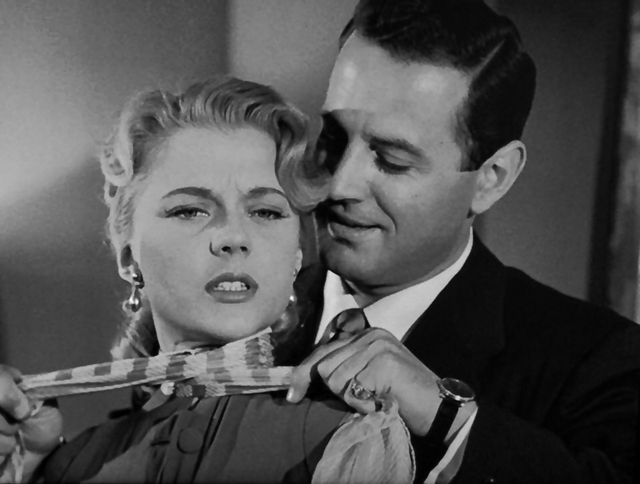
Things couldn't get worse for the poor mug when the night turns the screws on him again. Christopher (Jay Adler), the fence Victor planned to sell his diamonds to, doesn't like when women get involved in his business. No problem, as far as Victor is concerned; after getting Pauline to put in a call for Ernie's cab, he kills her and dumps her body in the backseat, leaving Ernie with his wife's corpse in his cab and a warrant for his arrest.
Evelyn Keyes was probably the biggest face in the cast of 99 River Street. Her first big role was a small part in Gone With The Wind, playing Scarlett O'Hara's sister Suellen. The rest of her career featured a few big films (Here Comes Mr. Jordan, The Jolson Story) and a lot of smaller ones (The Desperadoes, The Mating of Millie, Mr. Soft Touch, Iron Man). Her last really big part was as Tom Ewell's wife in The Seven Year Itch. Her last appearance onscreen was in 1987's The Return to Salem's Lot.
John Payne was a second-string matinee idol in the '40s, in pictures like The Great American Broadcast, Sun Valley Serenade, Remember the Day and The Dolly Sisters; audiences today will remember him as the lawyer living next door to Maureen O'Hara and Natalie Wood in Miracle on 34th Street. He spent two years starring as Vint Bonner on The Restless Gun; his last role was on an episode of Columbo.
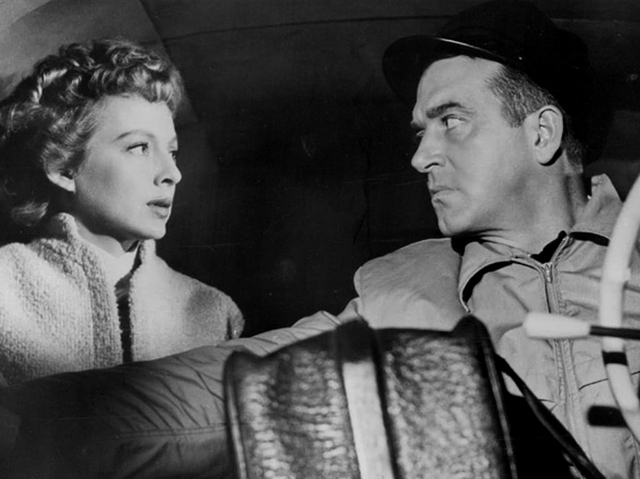
Peggie Castle's career was less distinguished, with pictures like I, The Jury, Jesse James' Women and Arrivederci Roma, and TV parts in Gunsmoke, Perry Mason, 77 Sunset Strip and The Virginian. Brad Dexter did far better, playing a corrupt cop in The Asphalt Jungle, which set the tone for a career of villains on TV and in films like The Oklahoman, Run Silent, Run Deep and Last Train from Gun Hill. He was a gunslinger in The Magnificent Seven and saved Frank Sinatra from drowning in Hawaii during the filming of None But the Brave, for which Sinatra awarded him with a vice presidency at Sinatra Enterprises.
He appeared in Von Ryan's Express and produced The Naked Runner, but resigned after production ended, citing the difficulty of working with Frank. He produced Lady Sings the Blues and returned to acting in the '70s, with TV parts in McCloud, Kojak, S.W.A.T. and The Incredible Hulk and movie roles in Shampoo and Winter Kills. This adds up to a cast full of faces that you recognize without the weight of a whole career of star turns behind them, which is perfect for a late period noir like 99 River Street, where nobody really looks heroic, and the glamour is past its sell date.
Director Phil Karlson had the sort of career that Hollywood used to be built on – never a star or a celebrity in his profession, as much as the sort of director who kept sound stages running, crew employed, and cash flow liquid during boom and bust. He began as an assistant director at Universal, moving on to Monogram and Columbia with pictures like The Invisible Man Returns, Seven Sinners, G.I Honeymoon, In the Navy, Kilroy was Here and Lorna Doone.

By the '50s he was known as a director who could make a low budget look like it cost a lot more – a useful talent, but a dubious one when budgets and shooting schedules were getting tighter all the time. He was bounding from studio to producer and back again all over the decade, making swashbucklers (Mask of the Avenger, The Brigand) and westerns (The Texas Rangers, Gunman's Walk) and noirs (Tight Spot, 5 Against the House, The Phenix City Story). He directed the pilot for The Untouchables and was Harry Saltzman's first choice to direct Dr. No, but Karlson asked for too much money.
He made a film with Elvis (Kid Galahad) and two of Dean Martin's Matt Helm pictures (The Silencers and The Wrecking Crew); he made Ben, a thriller about a boy and his mouse in 1972, and had a huge hit with Walking Tall a year later, making a fortune thanks to owning a big part of the percentage on the Joe Don Baker smash. He retired with Framed, another Baker picture two years later, and died in 1982. It took four decades, but Phil Karlson finally got out of Hollywood what he put into it.
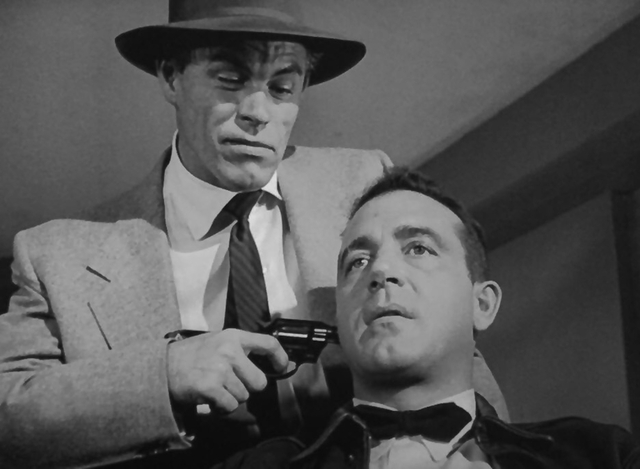
By the time Ernie finds his wife's body in the back of his cab, Linda has come back to him, pleading for forgiveness – she's even quit the play to help assuage her guilt. This makes her the only person, besides Stan at the cab company, who has his back while he tries to find Pauline's killer. Searching Victor's apartment, Ernie is blindsided by Mickey (evergreen film heavy Jack Lambert), Christopher's muscle, who thought he could cut a side deal with Victor after his boss turned the jewels down.
The henchman makes the mistake of provoking the slugger with slaps and punches, finally winding him up to where Ernie explodes at the gunman, boxing him all over the apartment before getting the info that his wife's killer planned to sneak out of the country on a freighter leaving from New Jersey. Karlson's camera hungrily takes in the violence with the same lack of restraint that it ogled Pauline.
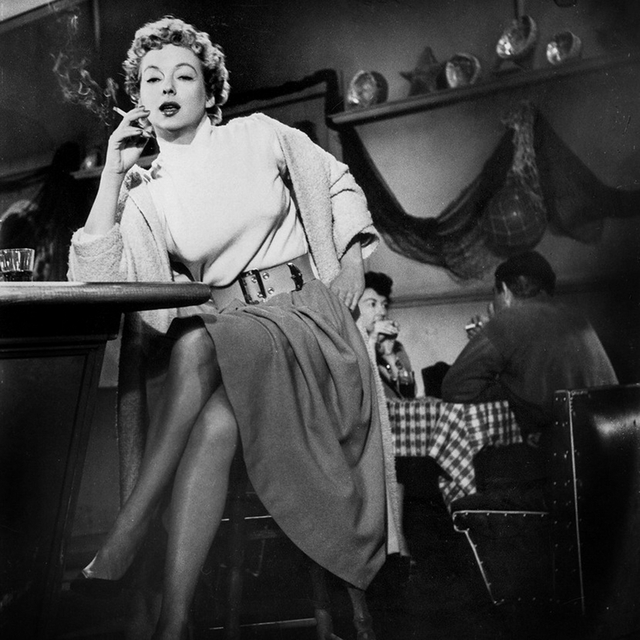
While Stan leans on other taxi dispatchers for info on fares going across the Hudson, Ernie and Linda try and stay ahead of both the police and Christopher, who wants his money back. They end up tracking Victor down to a waterfront bar, but Linda gets in ahead of Ernie, and sets about putting on the performance of her life as a soused barfly looking for a good time, hoping to lure Victor out into the street where Ernie can confront him, not knowing that Christopher and Mickey are out there as well.
At this point everyone who isn't dead is desperate – for money, for escape, for vindication, for forgiveness. It's a zero-sum kind of world, and a specialty of Karlson's. Writing about the director on the Senses of Cinema blog, Wheeler Winston Dixon describes it as "a truly bleak vision of American society ... a world where everything is for sale, where no one can be trusted, where all authority is corrupt, and honest men and women have no one to turn to but themselves if they want any measure of justice."
Even if you found Linda's histrionics in the theatre scene earlier a bit overcooked, Keyes really pulls out the stops in the bar, dancing to the jukebox and pouring on the slatternly charm for the reptilian Victor. Her brittle, needy aspiring actress turns into a great performer just when she needs to, and she just manages to get Victor outside – where Christopher and Mickey are waiting.
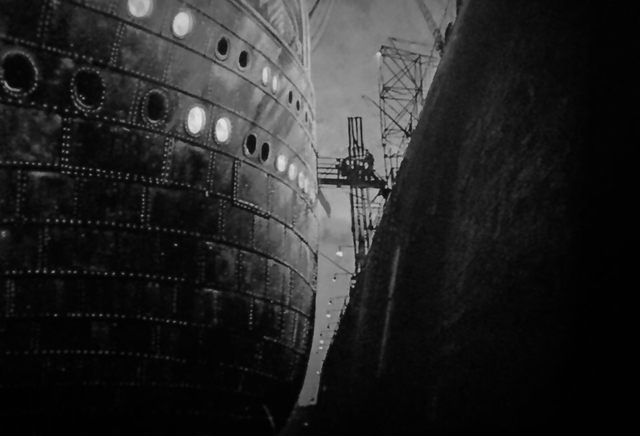
The climax is more than a little evocative of the chase through the dockside warehouses of New Orleans in Elia Kazan's Panic in the Streets three years earlier; Ernie manages to get clear of Christopher and Mickey but Victor puts a slug in him before sprinting for the waiting freighter. The wounded boxer struggles against the pain and loss of blood and corners the killer on the gangplank. Even more than with Mickey's beatdown, Karlson and editor Buddy Small really sell the violence you'd expect from a prizefighter unrestrained by the rules of the ring. Ernie rains down blows on Victor high above the dock and the water, a cathartic explosion of rage that would rarely be seen in movies until directors like Martin Scorsese took up Karlson's torch.
A more perfect version of 99 River Street would end there, but there's a coda that feels tacked on, with Ernie now married to Linda, co-owners of the gas station that was his dream, Broadway obviously left behind for her. Perhaps it was added without Karlson's cooperation, but worldview aside, the director was a professional who knew what to do to keep working. But while a compromised ending might be fitting to a film set in a compromised world, viewers will want to be ready with their remote to make their own hard edit at the end of the last fight.
Mark Steyn Club members can let Rick know what they think by logging in and sharing in the comments below, as access to the comments section is one of many benefits that comes along with membership in the Mark Steyn Club.


